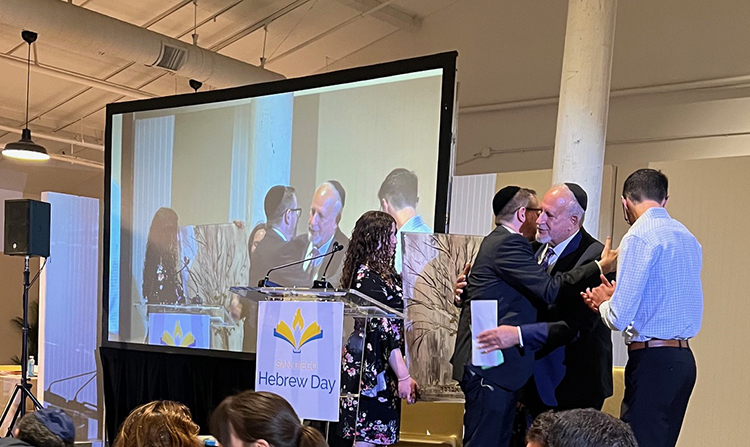
By Donald H. Harrison
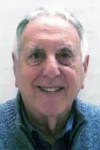
SAN DIEGO – More than 300 people attended a gala Sunday night, May 18, honoring the legacies of Rabbi Simcha Weiser and his late wife Betty, respectively the former headmaster of San Diego Hebrew Day School and the developer of the school’s Judaic program especially for girls.
Other highlights of the evening at the Julep venue on Hancock Street included the passing of San Diego Hebrew Day School’s presidential gavel from Moises Eilemberg to Miriam Belsky; an interview by Belsky of former Israeli Ambassador Ido Aharoni; and a speech by Rabbi Dovid Refson, founder of the Neve Yeushalayim college for Jewish women, who flew in from Israel, especially for the occasion.
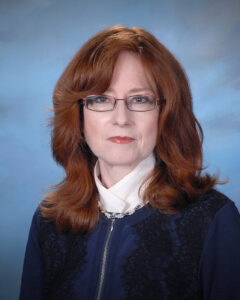
Rabbi Weiser, who helmed the preK-8th grade Hebrew Day School from 1981 to 2024, when he was succeeded as head of school by Rabbi Benjamin Geiger, and Weiser’s late wife and educational partner Betty, who died April 2024, were honored in written remembrances, speeches and videos. When his turn came to speak, Weiser called for a re-direction of the evening’s rhetoric, from looking back to looking toward the future.
One risk of gratitude, he said, is to “become too focused on the past and become nostalgic” but “I ask each and every person in this room to look forward. … This gratitude in this room that I really appreciate you expressing, and the gratitude I am expressing now, it should carry us forward and ahead, full speed ahead, in support of Rabbi Geiger and the future of the Jewish people and the future of San Diego Hebrew Day School …”
“It’s important that you give the lessons that we teach, the learning that takes place, the connection with Israel that we forge, it carries the world over,” Weiser, who serves as the school’s executive vice president, continued. “It makes the future possible. As grateful as any of us feel at this moment, capture that energy and focus it ahead, not behind. That’s the challenge that we have to face.”
“Finally,” he said, his voice cracking with emotion, “I want to invoke that voice of Betty Weiser. “I want to credit all of this to her clear voice, her kind of vision that she enjoyed throughout her life. It should speak on high for the benefit of each and every one of us and be carried forward.”
Refson, whom Weiser identified as a “dear friend,” described the Weisers as an “original power couple – the faith that they had for each other, the love for each other, the admiration for what the other was capable of.”
*
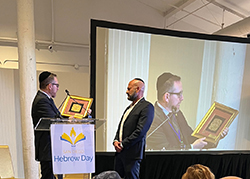
Moises Eilemberg, the chief executive officer of XiltriX North America – a company that monitors critical systems in biotech and biopharma laboratories — served on the Hebrew Day School board for 11 years and as its president for the last six years. Rabbi Geiger presented him with a plaque honoring his service.
“In the spirit of going from strength to strength, it is time for me to pass the president’s gavel to a new and much improved leader,” Eilemberg said. “Miriam Belsky is a diplomacy and nonprofit executive with two decades of experience in foreign policy, civic engagement and organizational leadership. Among several roles in Israel’s diplomatic missions in the U.S., she served at the Israeli Embassy with Ambassador Michael Oren … She later became the founding Deputy CEO of the Israeli-American Council, helping to grow it into a national organization. Today she serves as the Western Regional Director of the Washington Institute for Near East Policy, advancing the understanding of U.S. interests in the Middle East among American policy leaders.”
After accepting the symbolic gavel, Belsky introduced Aharoni, who spent 2010 through 2016 with the rank of ambassador in his role as consul-general in New York City before retiring as an Israeli diplomat and entering the world of private consulting and academia. It is in the latter field that Aharoni currently is completing a contract as a guest lecturer at both UC San Diego and San Diego State University under the auspices of the Murray Galinson San Diego-Israel Initiative.
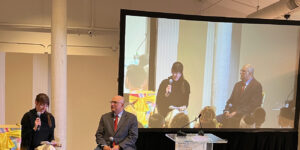
After the lectern was replaced on the stage by chairs, Belsky engaged Aharoni in a conversation about the situation that Jews find themselves in today. He said that there’s a phenomenon called “concept creep” in which reasonable propositions are so extended that they become unreasonable. Seeing the world through the eyes of the underdog was a reasonable concept that was later enlarged to believing that the underdog was always right, and could do no wrong. Palestinians were deemed underdogs, while Israelis were dismissed as colonizers with “white privilege,” Aharoni said.
While this may be a theme among some political activists, Aharoni said, generally “people love Israel” as was evidenced at the most recent Eurovision contest at which Israeli singer Yuval Raphael was greeted enthusiastically and awarded second place, behind Austria’s JJ, notwithstanding street protests against Israel.
Asked what can be done to counter the growth of antisemitism, Aharoni responded that intense Jewish education, such as that offered at Hebrew Day School, must be made accessible to Jewish communities throughout the world.
“The Jewish community is losing a lot of people on the periphery, for whatever reason … but the nucleus, the people at the core, are more devoted than ever,” Aharoni said.
Jews represent only one-fifth of one percent of the world population, Aharoni declared. Jews are vastly outnumbered by other religious groups, particularly by 1.4 billion Muslims who, he said, are taught to demonize Jews.
As a matter of self-defense, Jews must remain at the forefront of the revolution in technology, Aharoni said. “We need to work with avatars; we need to work with bots; we need to use our brains to compensate for the fact that we are at such a built-in disadvantage.”
Belsky asked Aharoni to describe one thing that Americans misunderstand about Israelis.
He responded, “Israelis are insecure. We fight the Arabs during the day, but at night, we are still fighting the Nazis.”
At the conclusion of their dialogue, Belsky inquired of Aharoni what role Jewish day schools may play “in shaping the future of the American Jewish community and our relationship with Israel?”
In 1948, when Israel declared its independence, only 17 percent of American Jewry identified as Zionists, yet “Israel would not have happened, Israel would not have been established were it not for American Jews,” Aharoni answered.
“Ben-Gurion and Golda (Meir) were raising money here like crazy … Teddy Kollek came to San Diego to raise money … We had no money to buy bullets in 1948… We had nothing … So, you are the future, you are the key …”
*
The gala had begun at 5:30 p.m. and during the kosher dinner service, most of the men affiliated with the Orthodox institution – board members, administrators, community supporters among them – stepped out of the room to conduct routinely another kind of service, Mincha/ Maariv (combined afternoon and evening prayers).
It was a natural expression of traditional Jewish life and values. So was paying tribute to the memories of the recently deceased Betty Weiser, Raphael Silverman, and Sandra Dimenstein – in different ways, all contributors to the welfare of San Diego Hebrew Day School—an acknowledgment that progress owes its birth to our forebears.
*
Donald H. Harrison is publisher and editor of San Diego Jewish World.